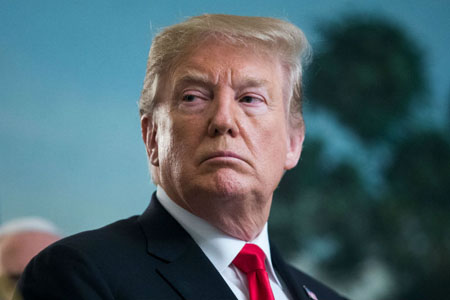by WorldTribune Staff, February 6, 2024
A federal appeals court on Tuesday ruled that Donald Trump isn’t immune from prosecution over his contesting of the 2020 election.
In a decision that was widely expected, a three-judge panel of the U.S. Court of Appeals for the D.C. Circuit dismissed Trump’s arguments that his efforts during the final months of his presidency to undo his reported loss fell within the ambit of his official duties.

“For the purpose of this criminal case, former President Trump has become citizen Trump, with all of the defenses of any other criminal defendant,” the panel wrote in a 57-page opinion. “But any executive immunity that may have protected him while he served as President no longer protects him against this prosecution.”
Many observers said it would have have been surprising for the court to rule in Trump’s favor given the make-up of the three-member appellate panel, which included Judge Karen L. Henderson, a George H.W. Bush appointee, and Judges Florence Y. Pan and J. Michelle Childs, both named to the court by Joe Biden.
Trump said in a Truth Social post following the decision: “If immunity is not granted to a president, every president that leaves office will be immediately indicted by the opposing party. Without complete immunity, a President of the United States would not be able to properly function.”
Human Events editor Jack Posobiec noted in a social media post: “This presidential immunity ruling means Biden can be indicted right now for treason by aiding an invasion.”
Trump’s legal team now has until Feb. 12 to appeal to the Supreme Court before the decision takes effect. If Trump goes to the justices within that six-day stretch, the panel said, its decision won’t take effect pending the Supreme Court’s consideration.
Trump will seek an appeal “in order to safeguard the Presidency and the Constitution,” said Steven Cheung, a Trump spokesman.
“If immunity is not granted to a President, every future President who leaves office will be immediately indicted by the opposing party,” Cheung said. “Prosecuting a President for official acts violates the Constitution and threatens the bedrock of our Republic.”
Law professor Jonathan Turley noted that Trump “can seek corrections in the short term but, even without a correction to the opinion, he has 45 days to seek an en banc where the government is a party. He then has 90 days after the rejected of any en banc decision.”
Trump could extend the process by 135 days absent a successful move to expedite by special prosecutor Jack Smith.
“The 90 day period alone would put a petition into May. Any rejection of appeals, without an expedited calendar, puts this into the summer,” Turley wrote. “That is without delays or a successful grant on by the D.C. Circuit (unlikely) or the Supreme Court (uncertain). After that appellate line is tied off, the parties would have to return to the trial court to resume the pre-trial work, which could take months. That puts the trial very close to the election and would raise obvious concerns given the long-standing DOJ policy to avoid trials within a few months of an election.”
Turley added: “Notably, in a footnote at the end of the decision, the panel declines to look at the merits of the threshold challenge that the appointment of Special Counsel Smith is invalid because (1) no statute authorizes the position Smith occupies and (2) the Special Counsel is a principal officer who must be nominated by the President and confirmed by the Senate.”
Tuesday’s decision came just days after a federal judge indefinitely postponed Trump’s trial, initially set for March 4, and said she would set a new schedule “if and when” the former president’s appeal is resolved. Judge Tanya Chutkan, an Obama appointee, had rebuffed Trump’s immunity claims in early December, ruling that his former office “does not confer a lifelong ‘get-out-of-jail-free’ pass.”
Quality Resource for Citizen Journalists
